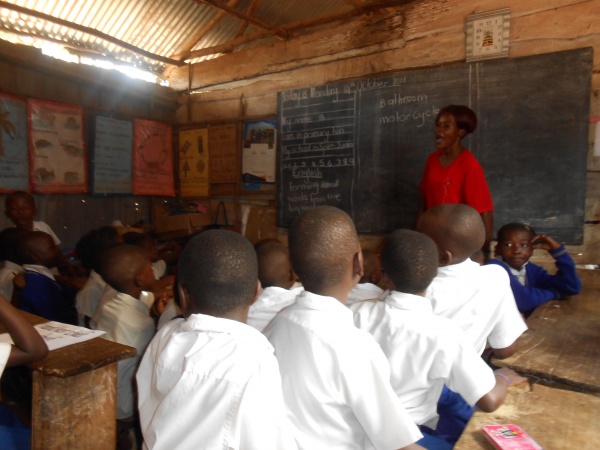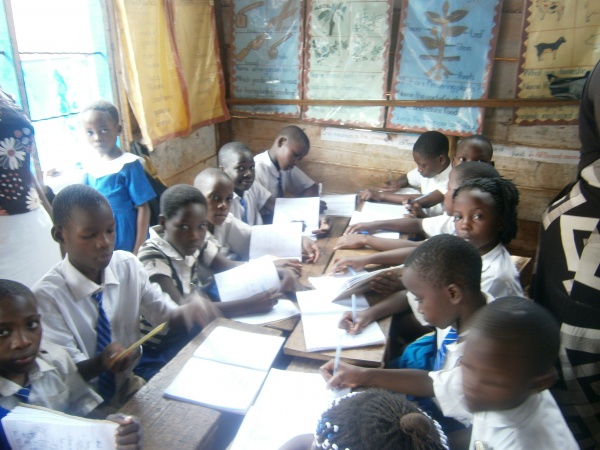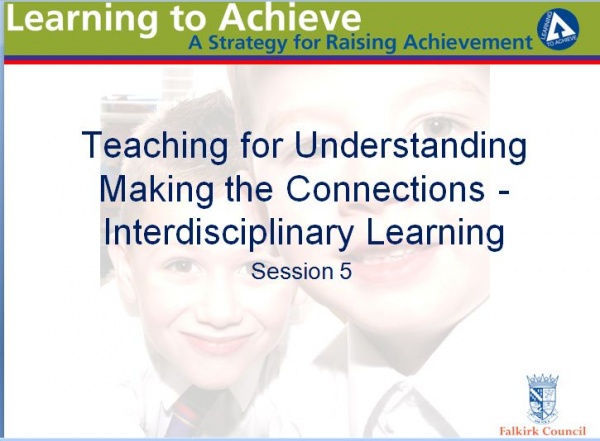Yvonne McBlain, from Falkirk Council curriculum support team was fascinated to hear about the parallels observed by Sarah Ritchie and Jill Stocks during their recent visit to Uganda. Sarah embarked upon this visit expecting to focus on the differences between Scottish teaching and that delivered in Uganda. However, instead she has been struck by the similarities of the fundamental elements of teaching in Kampala and Bonnybridge! One of her first observations was the sharing of learning objectives with pupils – in Kampala classrooms these are very effectively shared with pupils – despite the differences in resourcing levels there. Teachers in Uganda are challenged by very large classes, small classrooms and limited resources – a chalk board and a piece of chalk basically. In spite of these limitations these teachers are making extremely effective use of what we would call formative assessment. Other aspects of practice familiar to Scottish teachers commonly used were: pupils teaching pupils, active strategies used to gauge understanding, regular peer feedback, a very natural and integrated use of outdoor learning, and a very creative range of randomising techniques. Teachers at every stage ensured that pupils had a clear understanding of success criteria for their tasks. The ethos and life of this Kampala school was overwhelmingly positive and affirmative and achievement and learning was truly and enthusiastically celebrated. Click here to view a page of teacher planning Uganda style, and click on the pictures at the start of this post to see short video clips taken by Sarah during her visit.
Tag: Interdisciplinary Learning
Partnership working towards the Commonwealth Games
 Yvonne McBlain from Falkirk Education Services curriculum support team has been finding out about some excellent partnership work instigated by Sarah Ritchie, principal teacher at Bonnybridge Primary School. Bonnybridge Primary School has formed a partnership with Spire Junior School in Uganda. Spire Junior school is located in Bwaise –Kazo Nakamiro Zone in Kampala District the major city in Uganda. The partnership aims to increase understanding and awareness of each other’s culture, tradition and life style, encourage open mindness, critical thinking and reasoning in pupils and give pupils a true sense of global citizenship. Pupils in Primary 5 have been working closely with their peers in Uganda exchanging letters and photographs. Click here to view some of these letters written by primary 2 pupils. This joint project, Through My Window, compares the impact that the environment has on the daily lives of pupils in both countries. The partnership has been hugely successful for both schools and has had a positive impact on pupils. To ensure the growth of the partnership Mrs Stocks, head teacher at Bonnybridge PS, and Mrs Ritchie secured funding from the British Council visited Uganda in October. 3 planes and 14 hours later they found themselves in the city of Kampala where they were very warmly welcomed by Peter Basoga, Principal Teacher of Spire Junior School, and Godfrey Muyodi, class teacher. Over the course of the week Jill Stocks and Sarah Ritchie met with teachers and pupils, observed lessons and took part in the daily life of the school. The arrived colleagues and left friends – look at the leaver’s assembly planned for them here. Peter Basoga and Godfrey Muyodi from Spire Junior School will visit Bonnybridge Primary School in December 2013. Click here to view the welcome received by Sarah and Jill, and here to see Bonnybridge pupils talking about the project.
Yvonne McBlain from Falkirk Education Services curriculum support team has been finding out about some excellent partnership work instigated by Sarah Ritchie, principal teacher at Bonnybridge Primary School. Bonnybridge Primary School has formed a partnership with Spire Junior School in Uganda. Spire Junior school is located in Bwaise –Kazo Nakamiro Zone in Kampala District the major city in Uganda. The partnership aims to increase understanding and awareness of each other’s culture, tradition and life style, encourage open mindness, critical thinking and reasoning in pupils and give pupils a true sense of global citizenship. Pupils in Primary 5 have been working closely with their peers in Uganda exchanging letters and photographs. Click here to view some of these letters written by primary 2 pupils. This joint project, Through My Window, compares the impact that the environment has on the daily lives of pupils in both countries. The partnership has been hugely successful for both schools and has had a positive impact on pupils. To ensure the growth of the partnership Mrs Stocks, head teacher at Bonnybridge PS, and Mrs Ritchie secured funding from the British Council visited Uganda in October. 3 planes and 14 hours later they found themselves in the city of Kampala where they were very warmly welcomed by Peter Basoga, Principal Teacher of Spire Junior School, and Godfrey Muyodi, class teacher. Over the course of the week Jill Stocks and Sarah Ritchie met with teachers and pupils, observed lessons and took part in the daily life of the school. The arrived colleagues and left friends – look at the leaver’s assembly planned for them here. Peter Basoga and Godfrey Muyodi from Spire Junior School will visit Bonnybridge Primary School in December 2013. Click here to view the welcome received by Sarah and Jill, and here to see Bonnybridge pupils talking about the project.
Inchlair Nursery learns about the Commonwealth Games
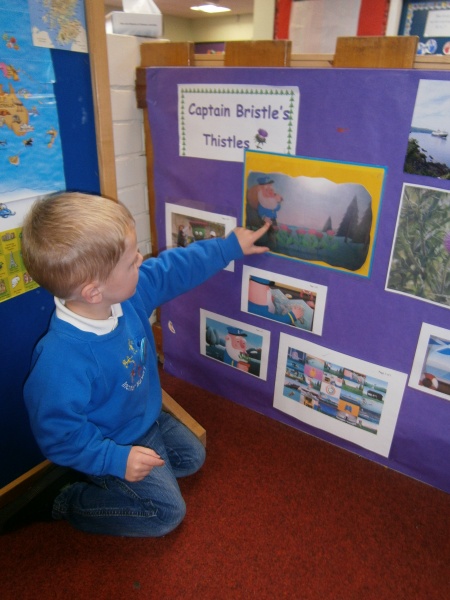 Yvonne McBlain from Falkirk Education Services Curriculum Support team has been finding out about some active and engaging interdisciplinary learning happening at Inchlair Nursery School. The pre and ante-pre school children have become immersed in preparations for the Commonwealth Games following their reading of the story “Captain Bristle’s Thistles”. This story (click to see the story video) really captured the imaginations of the children and has led very naturally into development of their knowledge within various disciplines. Isobel Edmond, head teacher at the nursery, has worked with staff colleagues to involve parents in extending and deepening pupil understanding of this international event. Click here to see one of the documents used to keep parents informed of developments with this interdisciplinary work. Click here to see how one of the children continued to develop his learning at home with his mum. Staff are responding to the children’s interest in the progress of the Queen’s Baton Relay by using a map display within the nursery. The children are developing this display by noting and bringing in photos or other items which show their links to the relay route on the map. Click on the photograph at the start of this post to watch Inchlair pupils sharing their learning.
Yvonne McBlain from Falkirk Education Services Curriculum Support team has been finding out about some active and engaging interdisciplinary learning happening at Inchlair Nursery School. The pre and ante-pre school children have become immersed in preparations for the Commonwealth Games following their reading of the story “Captain Bristle’s Thistles”. This story (click to see the story video) really captured the imaginations of the children and has led very naturally into development of their knowledge within various disciplines. Isobel Edmond, head teacher at the nursery, has worked with staff colleagues to involve parents in extending and deepening pupil understanding of this international event. Click here to see one of the documents used to keep parents informed of developments with this interdisciplinary work. Click here to see how one of the children continued to develop his learning at home with his mum. Staff are responding to the children’s interest in the progress of the Queen’s Baton Relay by using a map display within the nursery. The children are developing this display by noting and bringing in photos or other items which show their links to the relay route on the map. Click on the photograph at the start of this post to watch Inchlair pupils sharing their learning.
Larbert Cluster Interdisciplinary Planning
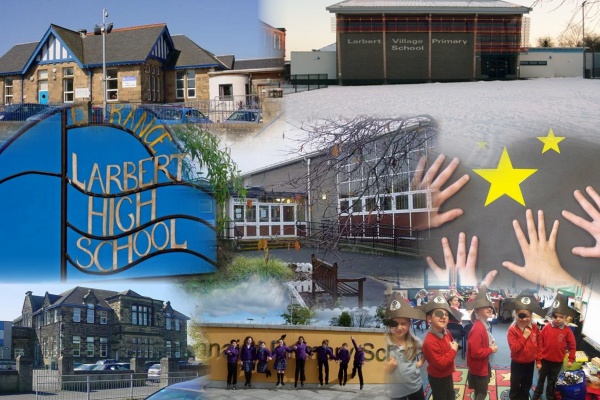 Yvonne McBlain of Falkirk Curriculum Support Team was thrilled to attend the first of a series of cross-sector cluster interdisciplinary planning sessions on Tuesday 17th September 2013. As chair of the Commonwealth Games Interdisciplinary Project sub-group, Linda-Anne Reid worked with colleagues to co-ordinate this collegiate planning. Early year’s practitioners and primary 1 teachers met in Stenhousemuir PS, first level teachers met in Carron PS, and second and third in Kinnaird PS. All staff were given relevant planning materials and information in advance, including the cluster plan, NAR planning flow chart, NAR planning flow chart instructions and Falkirk Community Trust/Active Schools Going for Glasgow Accreditation paper. Isobel Edmond provided early level practitioners with a very clear introductory overview of the potential benefits of this interdisciplinary learning context. Morag Carson then explained that each of the 3 hour-long planning sessions would involve same stage groups planning within 3 bundles of E & Os. This means that the Larbert cluster will generate at least 3 interdisciplinary plans per level which meet experiences and outcomes from: Social subjects & Expressive Arts, Social subjects & Technology, & Social subjects and Science. They are more than happy for these plans to be made available across the authority when complete. Once these groups were established, their first task was to identify the small bundle of E & Os they felt could be progressed by this context, for their learners. Yvonne and Linda-Anne enjoyed a whistle-stop tour of the nursery and primary 1 groups, and then nipped up to Kinnaird PS to pop into the second and third level groups. The staff involved had already made choices about their E & Os , and begun to consider learning intentions, and the best activities to develop knowledge, understanding and skills within the Commonwealth Games context. There will be 2 further planning sessions on 30th October and 21st November, but some groups have opted to do one double session instead. Although clearly linking into national events taking place in 2014, this way of working across-cluster offers potential benefits on many levels: the planning of robust interdisciplinary learning, development of understanding of skills progression, and the sharing of practice generally. All in all, a really active, purposeful form of collegiate professional learning!
Yvonne McBlain of Falkirk Curriculum Support Team was thrilled to attend the first of a series of cross-sector cluster interdisciplinary planning sessions on Tuesday 17th September 2013. As chair of the Commonwealth Games Interdisciplinary Project sub-group, Linda-Anne Reid worked with colleagues to co-ordinate this collegiate planning. Early year’s practitioners and primary 1 teachers met in Stenhousemuir PS, first level teachers met in Carron PS, and second and third in Kinnaird PS. All staff were given relevant planning materials and information in advance, including the cluster plan, NAR planning flow chart, NAR planning flow chart instructions and Falkirk Community Trust/Active Schools Going for Glasgow Accreditation paper. Isobel Edmond provided early level practitioners with a very clear introductory overview of the potential benefits of this interdisciplinary learning context. Morag Carson then explained that each of the 3 hour-long planning sessions would involve same stage groups planning within 3 bundles of E & Os. This means that the Larbert cluster will generate at least 3 interdisciplinary plans per level which meet experiences and outcomes from: Social subjects & Expressive Arts, Social subjects & Technology, & Social subjects and Science. They are more than happy for these plans to be made available across the authority when complete. Once these groups were established, their first task was to identify the small bundle of E & Os they felt could be progressed by this context, for their learners. Yvonne and Linda-Anne enjoyed a whistle-stop tour of the nursery and primary 1 groups, and then nipped up to Kinnaird PS to pop into the second and third level groups. The staff involved had already made choices about their E & Os , and begun to consider learning intentions, and the best activities to develop knowledge, understanding and skills within the Commonwealth Games context. There will be 2 further planning sessions on 30th October and 21st November, but some groups have opted to do one double session instead. Although clearly linking into national events taking place in 2014, this way of working across-cluster offers potential benefits on many levels: the planning of robust interdisciplinary learning, development of understanding of skills progression, and the sharing of practice generally. All in all, a really active, purposeful form of collegiate professional learning!
Introduction to the Storyline Approach
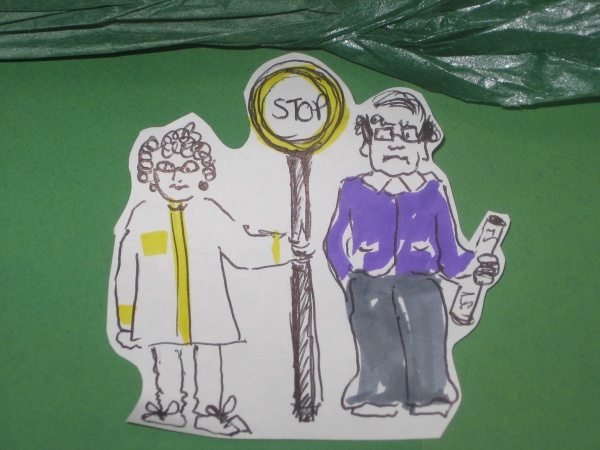 On 12th September 2013, Yvonne McBlain of Falkirk’s Curriculum Support Team delivered introductory training on the use of the Storyline Approach. The practitioners attending the training listened to a short presentation setting out the philosophy and structure of storyline methodology, but the bulk of the twilight session was about actually “doing” storyline. This involved them creating a setting for their storyline – in this case a new community (see below) called Camelon Court . They then worked collaboratively to create 3 families for this new community. As usual in storyline, the creation of these characters was enjoyable, engaging, and the resulting verbal introductions to the families was entertaining too. Click here to see the biography format used by the groups to create these families. Already we can see potential relationships and narratives emerging! Look out for part two next week!
On 12th September 2013, Yvonne McBlain of Falkirk’s Curriculum Support Team delivered introductory training on the use of the Storyline Approach. The practitioners attending the training listened to a short presentation setting out the philosophy and structure of storyline methodology, but the bulk of the twilight session was about actually “doing” storyline. This involved them creating a setting for their storyline – in this case a new community (see below) called Camelon Court . They then worked collaboratively to create 3 families for this new community. As usual in storyline, the creation of these characters was enjoyable, engaging, and the resulting verbal introductions to the families was entertaining too. Click here to see the biography format used by the groups to create these families. Already we can see potential relationships and narratives emerging! Look out for part two next week!
You may want to explore more Falkirk storyline work in our Storyline Glow group, or see what is happening nationally and internationally with the Storyline approach at http://www.storyline-scotland.com/
Pupils start making their version of Learning to Achieve
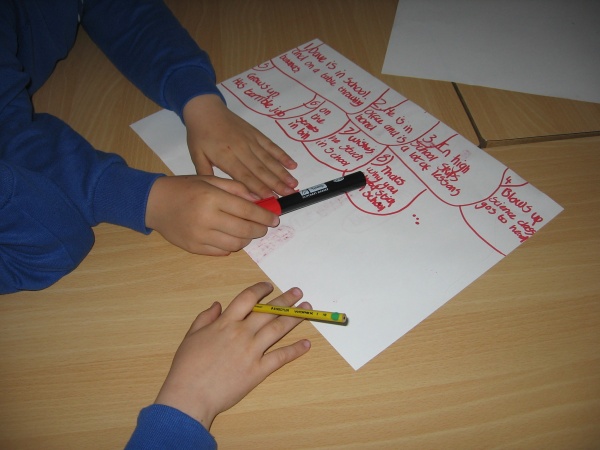 Yvonne McBlain from the Curriculum Support team is working with groups of pupils and their teachers to create the pupil version of Learning to Achieve, Falkirk’s education policy. Christine Snedden and Yvonne have been working with pupils and pupil council members for a while, to create the draft version of this policy. Groups of teachers and their pupils have now volunteered to turn this text document into something digital like a video or animation. John Chalmers primary 5 class at Grange Primary brainstormed ways that they could bring each bullet point to life. Click here to see some of their initial ideas – most groups thought about making drama performances which could be filmed. The animation club run by Sarah Ritchie at Bonnybridge Primary spent most of an afternoon coming up with ideas for animations which could bring each bullet point to life. Click on the photos to take a closer look at their initial ideas. Yvonne was very impressed by the way all of the pupils began this task – they quickly understood the message and content of the policy text in the document and made very clever judgements about how best to get their message across to fellow pupils. When these ideas are turned into a digital multi-media policy, the senior pupil council have suggested that this is shared with all pupils and staff working in education services at a launch assembly in every school, sometime in October.
Yvonne McBlain from the Curriculum Support team is working with groups of pupils and their teachers to create the pupil version of Learning to Achieve, Falkirk’s education policy. Christine Snedden and Yvonne have been working with pupils and pupil council members for a while, to create the draft version of this policy. Groups of teachers and their pupils have now volunteered to turn this text document into something digital like a video or animation. John Chalmers primary 5 class at Grange Primary brainstormed ways that they could bring each bullet point to life. Click here to see some of their initial ideas – most groups thought about making drama performances which could be filmed. The animation club run by Sarah Ritchie at Bonnybridge Primary spent most of an afternoon coming up with ideas for animations which could bring each bullet point to life. Click on the photos to take a closer look at their initial ideas. Yvonne was very impressed by the way all of the pupils began this task – they quickly understood the message and content of the policy text in the document and made very clever judgements about how best to get their message across to fellow pupils. When these ideas are turned into a digital multi-media policy, the senior pupil council have suggested that this is shared with all pupils and staff working in education services at a launch assembly in every school, sometime in October.
Celebrating Learning about the Bean Geese
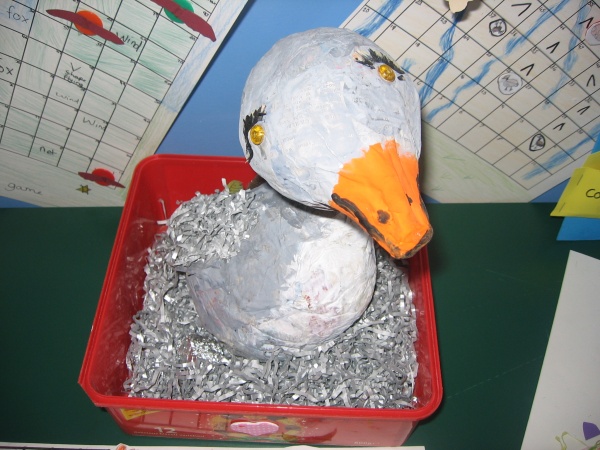 Yvonne McBlain from Falkirk Council Curriculum Support Team attended a great celebration of interdisciplinary learning at Slamannan Primary School on 29th May. Primary 4/5 and primary 5/6 have been part of some ground-breaking science work in partnership with the RSPB and Scottish Natural Heritage. They have been studying a species of goose which visits the fields around their school during the winter. The Slamannan plateau is the ONLY place in Scotland that these geese occur, and scientists have been trying for 20 years to discover where they go when they leave Slamannan. Partners from RSPB worked with Mrs Murray and Mr Findlay and their pupils to find out how to observe, capture, monitor and then track the geese as they left in springtime.
Yvonne McBlain from Falkirk Council Curriculum Support Team attended a great celebration of interdisciplinary learning at Slamannan Primary School on 29th May. Primary 4/5 and primary 5/6 have been part of some ground-breaking science work in partnership with the RSPB and Scottish Natural Heritage. They have been studying a species of goose which visits the fields around their school during the winter. The Slamannan plateau is the ONLY place in Scotland that these geese occur, and scientists have been trying for 20 years to discover where they go when they leave Slamannan. Partners from RSPB worked with Mrs Murray and Mr Findlay and their pupils to find out how to observe, capture, monitor and then track the geese as they left in springtime.
The pupils shared their valuable interdisciplinary learning with an invited audience via a power point presentation and received Certificates of Distinction in their learning from SNH and RSPB. They were presented with a class set of binoculars so that they can continue their observations of the Bean geese next winter. The pupils were excitied to discover that RSPB and SNH will work with them again next session and follow up on the pupils’ suggestion that they communicate with people who live where the Bean geese go for the summer. See pictures of the Bean Goose Project display below, and visit the pupils’ blog to find out where they tracked the geese down to.
Christopher in primary 6 said that his favourite part of the project was tracking the geese, and pupils in primary 4/5 said they enjoyed “All of it!”
Tapestry Masterclass – Making Thinking Visible
Yvonne McBlain was joined by a range of colleagues from Falkirk Education Service at the Tapestry Masterclass : Making Thinking Visible on 16th May. Mark Church was one of the main speakers – he is part of Project Zero at Harvard University. He suggested that schools should be learning cultures for adults, just as classrooms are for children. He posed a range of questions such as: Why does classroom and school culture matter to the learning that happens in this place? Click here to read an extract from “Making Thinking Visible : How to Promote Engagement, Understanding, and Independence for All Learners” by Mark Church, Ron Ritchhart & Karin Morrison, 2011. Chris McIlroy then delivered a presentation entitled “Seeing what they mean” (click here to view his power point notes). Click here to view thinking routine resources produced by Visible Thinking of Harvard Project Zero. Unfortunately, Yvonne couldn’t stay to hear Anne Pearson, Graeme Logan and Frank Lennon in the afternoon but it would be great to hear comments below from those who were there and can fill in the gaps.
Airth Primary Staff use Teaching for Deep Learning Session 5
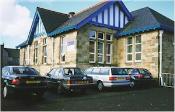 Yvonne McBlain, Support Teacher effective learning and teaching, facilitated a collegiate session with teachers at Airth Primary School using session 5 from the Falkirk Teaching for Deep Learning Programme. This session uses an interdisciplinary learning quiz to help evaluate existing practice. Staff involved said it was useful to “discuss how we effectively plan and deliver interdisciplinary learning, as well as highlighting our next steps.” In addition, the session “defined the different types of interdisciplinary learning and the need to make it obvious what skills were being used in type 1 and type 2”. Yvonne was able to adjust the content and format of this session so that staff could consider how to track the knowledge, understanding and skills being developed in the interdisciplinary work done at Airth PS. The session resulted in identification of some initial specific tasks for the staff as a whole, as well as individual next steps for teachers which included:
Yvonne McBlain, Support Teacher effective learning and teaching, facilitated a collegiate session with teachers at Airth Primary School using session 5 from the Falkirk Teaching for Deep Learning Programme. This session uses an interdisciplinary learning quiz to help evaluate existing practice. Staff involved said it was useful to “discuss how we effectively plan and deliver interdisciplinary learning, as well as highlighting our next steps.” In addition, the session “defined the different types of interdisciplinary learning and the need to make it obvious what skills were being used in type 1 and type 2”. Yvonne was able to adjust the content and format of this session so that staff could consider how to track the knowledge, understanding and skills being developed in the interdisciplinary work done at Airth PS. The session resulted in identification of some initial specific tasks for the staff as a whole, as well as individual next steps for teachers which included:
Think more about type 1 interdisciplinary learning and its place in my class
Look for type 1 IDL in the experiences and outcomes
Continue to encourage children to make connections between curricular areas.
Click to take a look at the power point notes for Session 5 , and here to take a look at the whole Falkirk Teaching for Deep Learning Programme in Glow.

